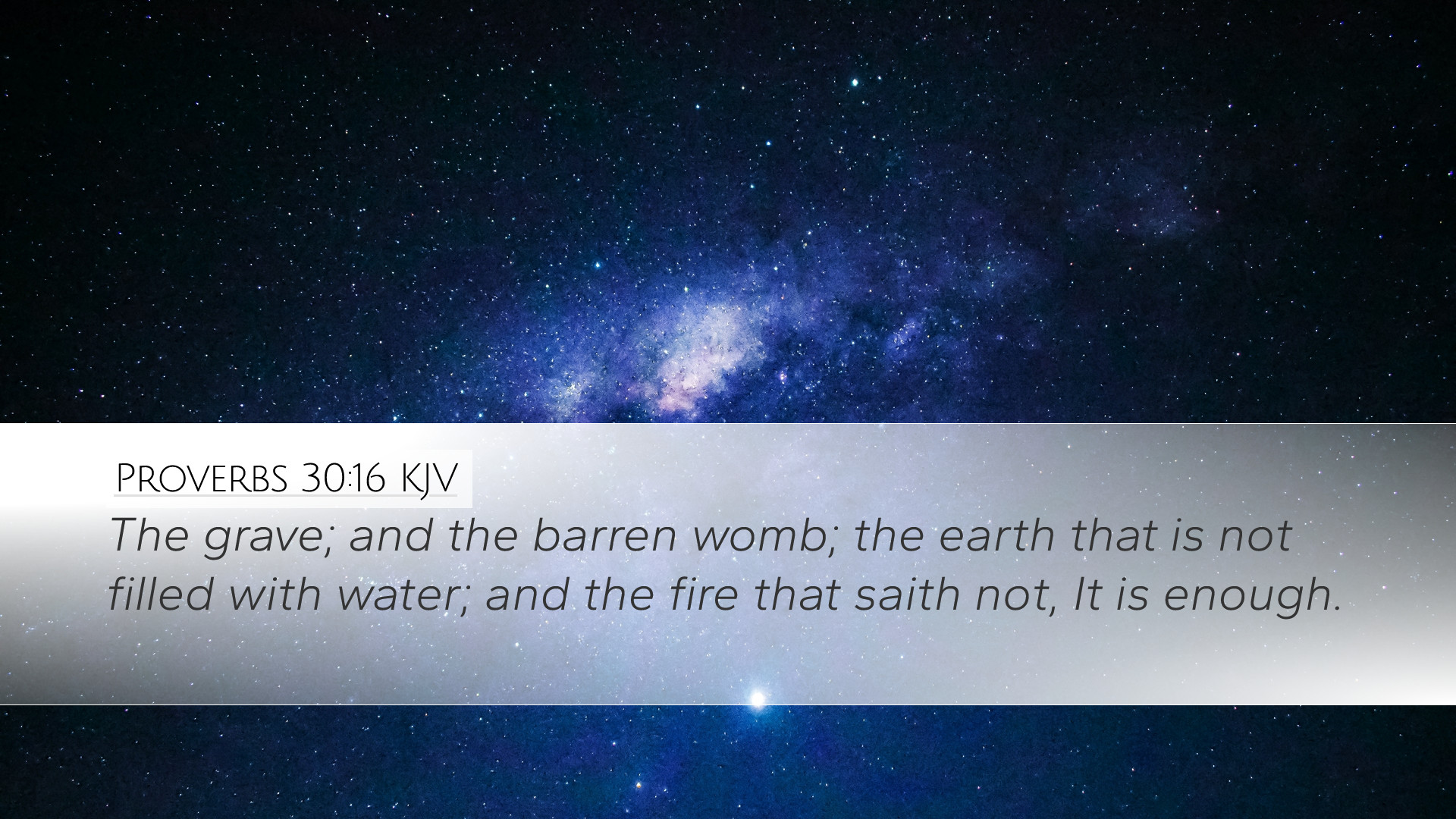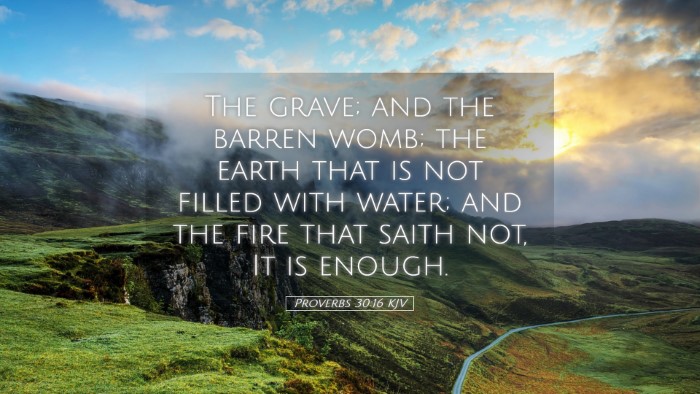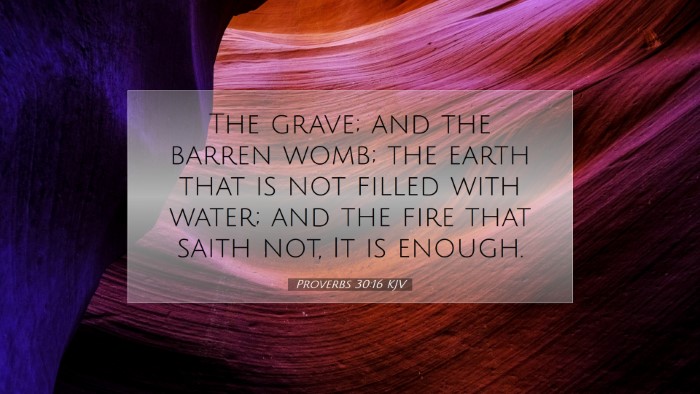Commentary on Proverbs 30:16
Proverbs 30:16 states: "The grave; and the barren womb; the earth that is not filled with water; and the fire that saith not, It is enough." This verse presents a tapestry of images that reveal profound truths about human existence and our relationship with God, the natural world, and our own limitations.
Contextual Overview
Underneath this succinct verse lies a wealth of meaning that warrants a closer examination. The author of these proverbs, traditionally believed to be Agur, uses metaphorical language to communicate core themes related to satisfaction, yearning, and the nature of creation.
Analysis of the Elements
-
The Grave:
The grave symbolizes the ultimate end of all human endeavors and the finality of life. As noted by Matthew Henry, it reminds us of our mortality and the transient nature of worldly pursuits. No matter how much a person accumulates or achieves, they will eventually face death. This serves as a sobering reminder for those seeking meaning in life.
-
The Barren Womb:
The barren womb serves as a potent symbol of unfulfilled desire and longing. Albert Barnes emphasizes that the anguish experienced by those unable to bear children is reflective of a deeper spiritual yearning. It speaks to the human condition of longing for purpose, fulfillment, and a legacy that seems just out of reach.
-
The Earth that is not Filled with Water:
This imagery of a parched ground evokes a sense of emptiness and desolation. Adam Clarke draws parallels between this image and spiritual thirst. Just as the earth yearns for rain, so too do individuals crave the living water that satisfies the soul. The mention of the earth reminds us of our dependence on God's provision and sustenance.
-
The Fire that Saith Not, It is Enough:
Fire is often seen as both a destructive and purifying force. Matthew Henry points out that it exemplifies insatiable desire—be it for power, wealth, or gratification. The fire's refusal to say "enough" encapsulates the relentless pursuit of that which cannot ultimately satisfy, echoing the wisdom found throughout Scripture regarding the fleeting nature of earthly pleasures.
Thematic Insights
Collectively, these images communicate deep theological insights that resonate throughout biblical literature:
-
Satisfaction and Contentment:
The call to finding contentment is a recurring theme in the Bible. This verse challenges the reader to ponder the nature of sufficiency and to reflect on that which truly satisfies. The use of these metaphors serves as an admonition against a life marred by constant striving for more, suggesting instead a need for recognizing and appreciating what one has.
-
Human Limitations and Divine Sovereignty:
Each element highlights our limitations as humans yet points to God's sovereignty over life and death, creation and provision. The grave reminds us that the timeline of our lives is not within our control. The barren womb and the parched earth signify human inability to fulfill certain aspirations, calling for reliance on God’s timing and plans.
-
The Nature of Desire and Longing:
The insatiable thirst of the parched earth and the fire’s greed reflect the intrinsic human longing for meaning and fulfillment. However, the Scriptures teach that true desire is met not in temporal pursuits, but in a deep relationship with God—the true source of life and satisfaction.
Practical Applications
For pastors, students, theologians, and Bible scholars, this verse is rich with practical applications:
-
Reflection on Mortality:
This verse encourages self-reflection on one’s mortality and the transient nature of life. It can serve as a prompt for deeper consideration of one's life priorities and values.
-
Encouragement for the Barren:
For those who might be in a season of waiting or unfulfilled desires, this passage offers both empathy and hope. It reminds us of God’s ultimate control over our lives and His ability to bring about growth and fulfillment in His timing.
-
Encouragement for Spiritual Growth:
This verse invites individuals to consider their spiritual thirst and hunger. Are we relying on God as our source of satisfaction? Are we cultivating our spiritual lives as we would tend to a garden in need of rain?
-
Resisting the Allure of Materialism:
It challenges us to resist the relentless pursuit of material gains that only lead to dissatisfaction, steering us to seek fulfillment in God's presence rather than in earthly rewards.
Conclusion
In summary, Proverbs 30:16 serves as a poignant and multifaceted reminder of the human experience in relation to life, desire, and the divine. Each of the images presented invites deep reflection on our own lives, the nature of satisfaction, and our reliance on God. By engaging with these insights, we are reminded of our need to seek fulfillment beyond the grave, barren womb, parched earth, and the unquenchable fire within, ultimately finding our satisfaction in the Lord.


